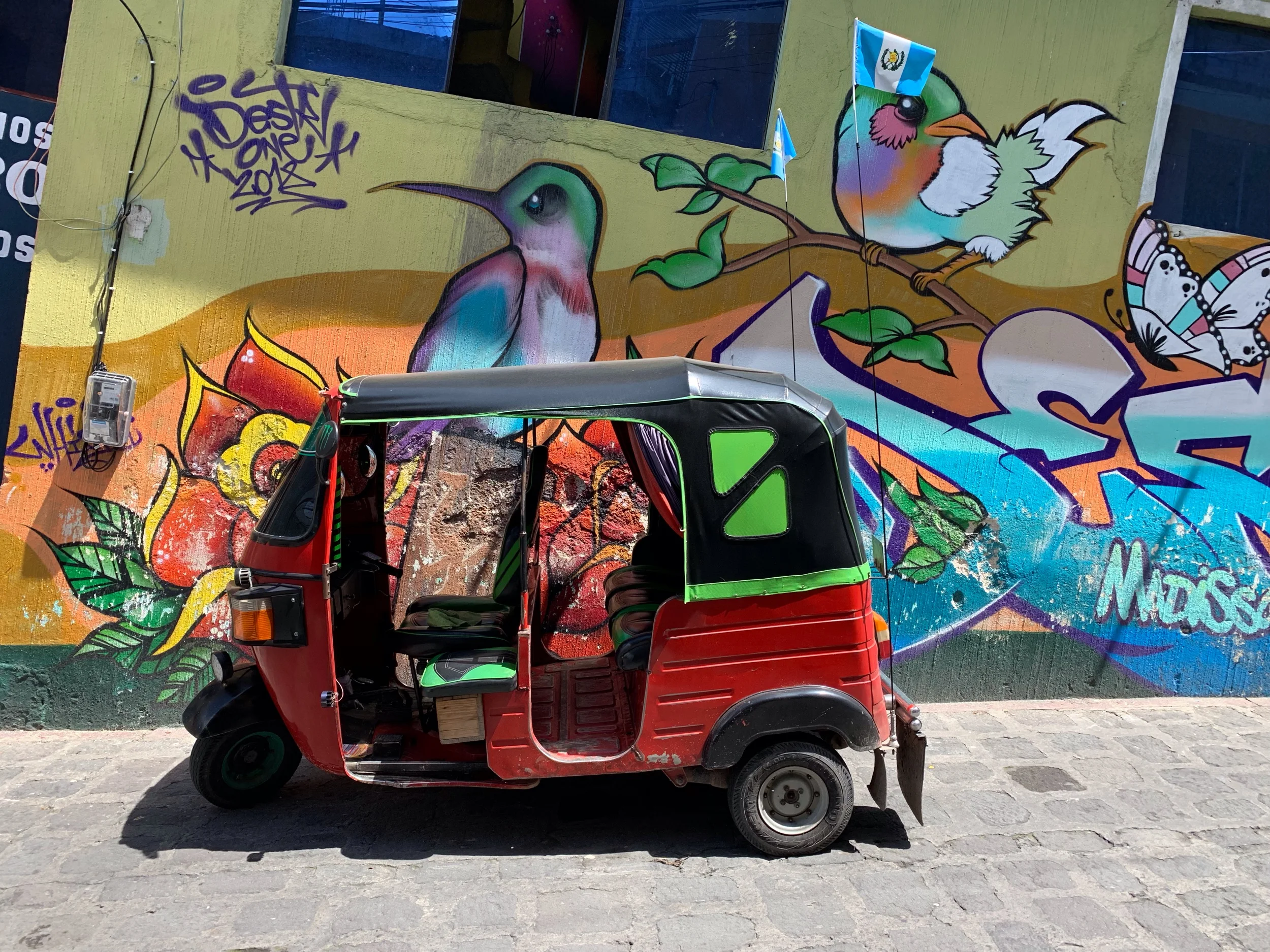Poco a Poco
San Pedro La Laguna — A glimpse into our daily walk to Spanish classes near the lake.
The best laid plans are usually not planned at all. We had only planned to stay at Lake Atitlán for a few days, however, those plans morphed into almost 2 1/2 weeks. It’s easy to succumb to the mystical beauty of this volcanic caldera. If 360 degree views of volcanoes (mostly inactive), tropical fruit trees of banana, papaya, and pineapple, gravity defying cornfields and coffee plantations aren’t enough to hook you, the warm Guatemalan welcome you’ll receive from each of the 11 towns (pueblos) around the lake certainly will.
We spent most of our time in San Pedro La Laguna, or San Pedro, for short. San Pedro is one of the larger pueblos around the lake with many of its touristy establishments situated closer to the lake and neighborhoods further up into the hills. Realizing rather early in our stay that we each could benefit brushing up on our Spanish skills, we enrolled in Spanish lessons at Community Spanish School.
Our Spanish school classrooms.
Alex and I opted to take 1-on-1 classes with our own instructor since we were starting at different levels. I studied Spanish in college but was pretty rusty, whereas Alex hadn’t studied it since high school. We initially committed to 1 week of classes but extended it to 2 weeks. The school offered a homestay with a local family for full submersion into the language and culture. This turned out being a deeply humbling and unforgettable experience for both of us and resulted in many new friendships. Given that indigenous Mayan languages are the primary language around town, with Spanish being the second, it was difficult at times to communicate even the most simple concepts with our host family. Fortunately they were fluent in Spanish and were extremely patient with us as we stumbled over our words. One funny example of this was when Alex and I were asked to guess our host mom’s age for her upcoming birthday and Alex tried to say “this game is not fun!” in Spanish, but it came out as “the juice is not happy!” instead. Obviously it made for a lot of laughs, but it underlined the importance of language as a means of bonding with others and sharing ideas.
Although in many ways rural Guatemala may appear less sophisticated than Western society regarding infrastructure, we found the resourcefulness and reuse of materials to be ahead of its time. Water is a precious resource and is typically delivered weekly to homes and establishments with massive vats found on rooftops throughout town. The result is a need to be more strategic in how water is used throughout a home — filling up a kitchen sink to do dishes instead of allowing a faucet to run freely, taking quick showers and reusing non-potable water as much as possible are a few examples. Plumbing infrastructure is more fragile and nothing non-organic can be flushed. Hot water is rare and most people use cold water, or in some cases the lake for those not fortunate to have a shower. Drinking water is purchased in 5-gallon jugs since faucet water is not potable. Absolutely nothing goes to waste here, as you’ll find plastic jugs reused as fishing buoys or dried palm leaves used as shelters.
Me and Manuela, my Spanish teacher (maestra).
Alex and her maestra, Lethy.
Our host parents, Edgar and Ana, grew up in San Pedro and have spent their entire lives around the lake, along with the majority of their siblings and extended family. They have two kids - the oldest, Lucas, who is in his twenties and their youngest, Teresita, in her early teens. Edgar and Ana have been working with the Community Spanish School for over 5 years and have a large house able to accommodate up to 7 students. A skilled welder and craftsman by trade, Edgar designed and built all of the steel windows, doors and mirrors throughout their house. Ana works closely with the school and the students, tirelessly working around the house and preparing amazing meals each day. Outside of our classes, we spent a large portion of our time chatting with Edgar, Ana and Teresita and exchanging stories and laughs. It was rare to not see one of them smiling and they were some of the friendliest people we’ve met.
Ana’s birthday fell on the first Friday we were staying with them. Some other students chipped in with us to buy her a birthday cake which she loved.
Ana made us tamales de arroz (rice) and papas (potatoes) which were so delicious.
In a period of a couple weeks, it was difficult to initially gauge the impact the homestay and schooling had on us. This is probably because we had in a short amount of time established somewhat of a daily regimen - wake up around 7a, eat breakfast with family, kayak or swim in the lake, eat lunch with family, go to school from 1p-5p, attend a school organized extracurricular activity, eat dinner with family, study more Spanish, sleep, then repeat. But the effects were significant when we looked back, as we grew much more confident in our ability to navigate day to day scenarios and at a minimum exchange a simple conversation with the locals.
Teresita helping Alex with some of her homework.
Edgar, Me, Ana, Alex, Josefa (Ana’s sister) and Teresita.
Between school organized activities and our host family inviting us to local events, we were fortunate to get a heavy dose of culture within a relatively short amount of time. From chocolate (cacao) makers to attending local fútbol (soccer) games, our next post will include more details and photos of some of these extracurriculars. We’ll continue progressing our Spanish speaking skills little by little, or poco a poco every day.













